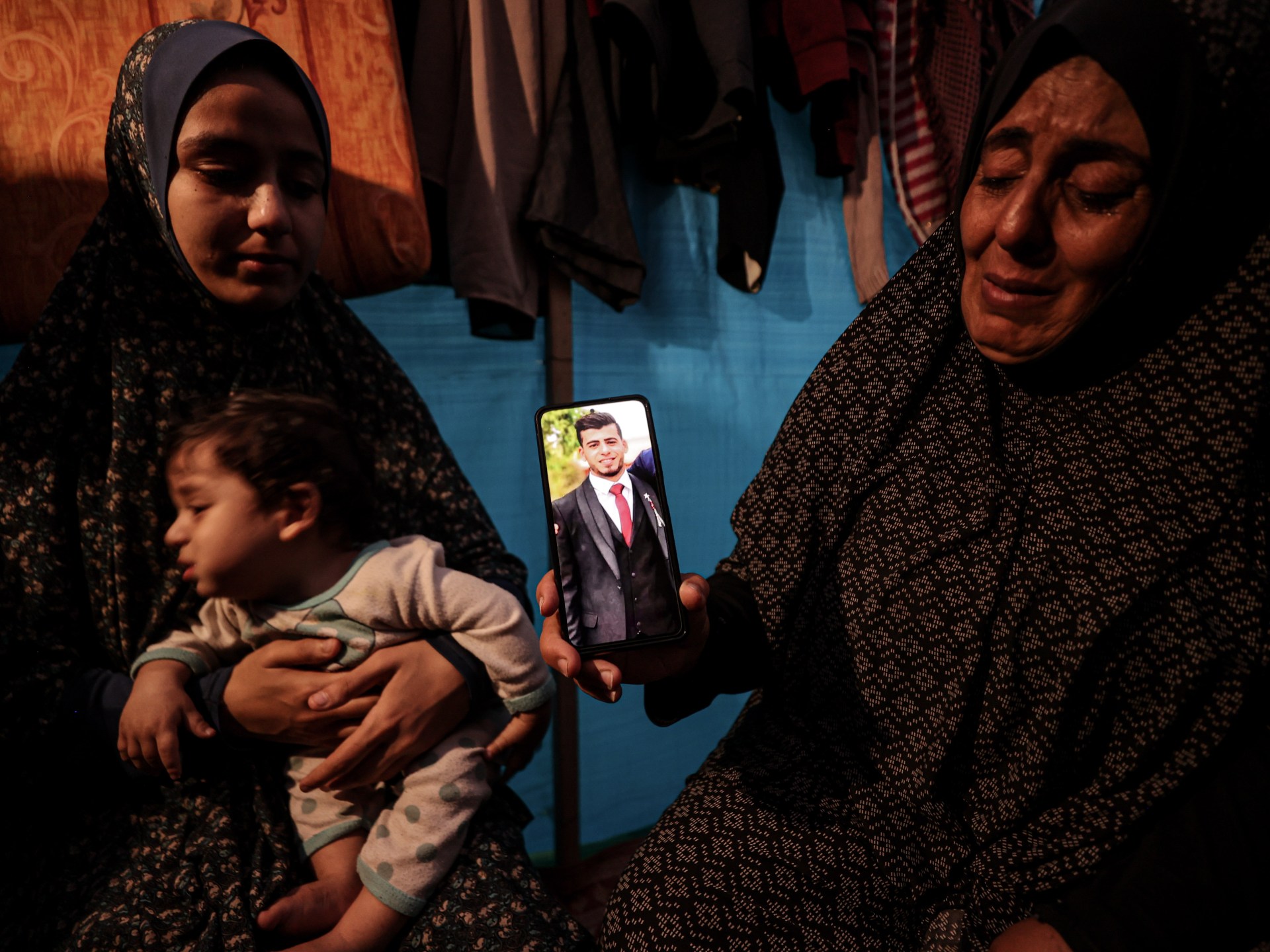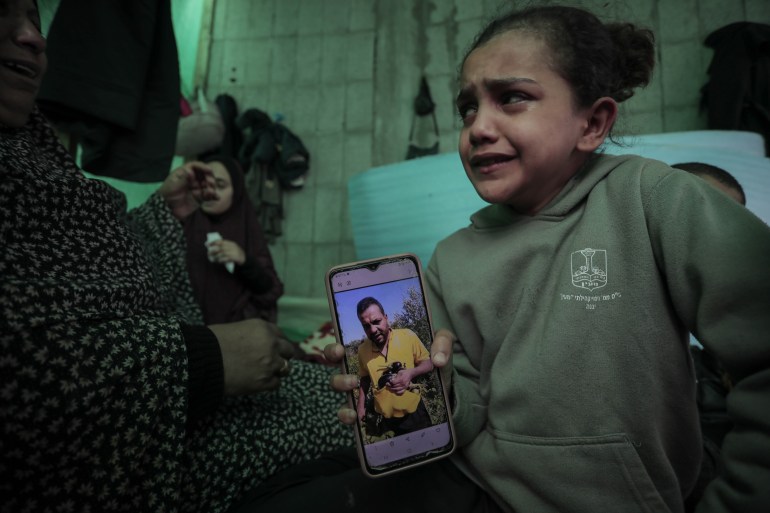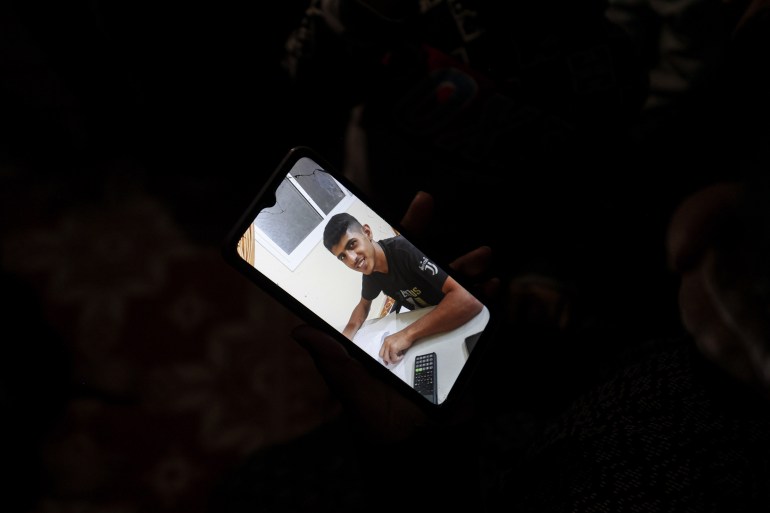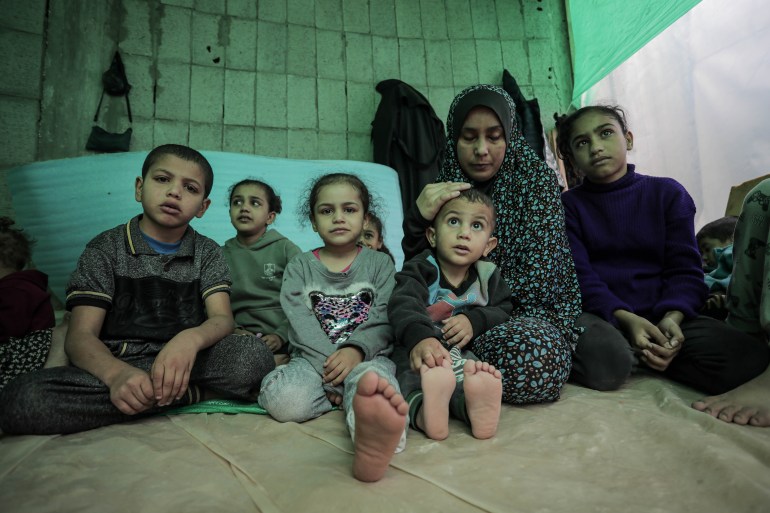
Deir el-Balah, Gaza Strip – It’s been two weeks and the al-Samounis still have no idea what happened to their sons and brothers. You are in shock.
The 36 women and children crammed into a displaced persons tent on the grounds of Al-Aqsa Martyrs Hospital have four blankets to share among themselves.
They used to live in Zeitoun, southeast of Gaza City, where they quietly farmed their 69 dunams (17 acres), they said.
But from the first day of the Israeli attack on Gaza, October 7, they had to flee south and decided to take what the Israeli army called a “safe corridor”: Salah al-Din, the main road from the north runs south in the Gaza Strip. But the corridor wasn’t so safe after all.
Zahwa al-Samouni, 56, could barely speak as she recounted how Israeli soldiers took her three sons away.
The family walked down the street, trying not to focus on the bodies of dead Palestinians on the ground, as they reached a newly constructed Israeli checkpoint. Before the family could pass through the turnstiles, the soldiers ordered 24-year-old Abdullah al-Samouni to move to the side of the road, into an invisible ditch. His younger brother Hamam, 16, began calling for Abdullah, visibly distraught. The soldiers ordered Hamam to join his brother.
The eldest brother, Faraj, a farmer and father of six, shouted at the soldiers, asking them where they were taking Abdullah and Hamam. His protest led to the soldiers ordering him to join his brothers.
The rest of the family walked through the turnstiles, stunned.
“As we passed the checkpoint, I saw two men in the ditch stripped down to their underwear and wearing numbers on their shoulders,” Zahwa said. “There were other men there and I could recognize my son Faraj.”
Their sister wife Zeenat, Abdullah and Hamam’s mother, said she had provided the brothers’ names, ID numbers and cell phone numbers to the Red Cross.

“Every day that goes by is like a year for us,” she said. “I sit at the entrance of the tent and hope that someone has news of them. I just want to know what happened to them, if they are okay and if they are alive.”
The mother of seven entered the so-called safe corridor three days before her sons and stepchildren. She had been staying at a relative’s house and then tried to get into school accommodation, but the bombings became too severe.
“We were scared, but we decided to take the risk because we knew other people who managed to get south,” said the 49-year-old. “We walked past our land and saw so many Israeli tanks and all our houses destroyed.”
Zeenat and her family raised white flags and their ID cards in front of the Israeli snipers.
“From 9 a.m. onwards, we were running with our hearts almost jumping with fear,” she said. “When we finally arrived in Deir el-Balah, the sun was setting.”
She said she saw torn limbs of children among the bodies on the street.
Zahwa said that when she made the same hike three days later, Israeli soldiers told her that anyone who did not move at all or look back would be shot.
“They mocked us as we passed the checkpoint,” Zahwa said. “They insulted us in Arabic with the worst words and cursed our Prophet Muhammad and God. They called us Hamas supporters and promised to finish us off if we went south.”
She clutched her face, tears streaming down her cheeks.
Her granddaughter and namesake, ten-year-old Zahwa, remembers the events of that day.

“We walked, my parents and two brothers and three sisters, and when we got to the checkpoint the Israelis took my father and my uncles,” she said with a clarity beyond her years.
“My father [Faraj] He held my hand and the Israelis took him away from me,” she said, her face contorted in pain. “The soldiers also took the bag that contained our clothes. Just clothes, no bombs or weapons,” she sneered.
The younger Zahwa said Israeli soldiers shot a man in front of them and did nothing as he bled to death.
“The man had learning difficulties,” she said. “He walked in a line and looked back. The soldiers told him to look straight ahead and when he turned his head they shot him in the stomach.”
“This is not a safe corridor, it is a death corridor. It is a corridor of fear,” she added. “They killed people, beat them and forced them to take off their clothes.”
A pillar in the family
The horrors experienced by the al-Samouni clan are the latest in a series of traumas that began as soldiers during Israel’s 2008-2009 offensive killed 48 of their family members in Operation Cast Lead.
The army had crowded several families under one roof and fired rockets at the house, killing dozens. Some people managed to get out with white flags, but when the Red Cross received permission to enter the building three days later, they were met with the shocking sight of 13 injured people, including eight children, who had gone without food or water for days from the bodies of their parents and relatives.

One of those killed was Zahwa’s husband Attiya. Her daughter Amal, Abdullah’s twin sister, was only eight years old at the time, but still remembers everything clearly.
“On that cold January day, 100 Israeli soldiers raided our house and killed my father in front of our eyes,” said the 24-year-old. “First they threw a grenade at the entrance of the house and covered us in smoke.”
The soldiers shouted in Hebrew for the homeowner to come forward. Attiya, who had previously worked in Israel, raised his arms and introduced himself.
“They shot him between the eyes, then in the chest,” Amal said. “Then they continued shooting and riddled his body with bullets.”
Earlier, when the tanks surrounded their house, Attiya had taught his children to say “We are children” in Hebrew, but it made no difference.
“After they shot my father, they started shooting at us,” Amal said. “Abdullah and I were both wounded. They started a fire in one of the bedrooms and we suffocated from the smoke.”
Hamam was barely a year old at the time. Her then four-year-old brother Ahmad was shot twice in the head and chest and left to bleed to death until dawn the next day as the Israeli army prevented ambulances from reaching the area.
Ahmad died in his mother Zahwa’s arms. She had lost her husband, her son and her home and in the 15 years since that fateful day the family had to work twice as hard to rebuild their lives.

Faraj was at the center of it all. Without any complaints, he immediately took on the role of master of the house and helped raise his younger siblings. He was a farmer and very clever. He built his house with his own hands and, despite their humble origins, refused any charity.
“He was a support we could all rely on,” said his mother Zahwa. “He was so caring and with him we never had to beg for anything.”
His daughter Zahwa can’t sleep at night and wonders whether her father is dead or alive.
“I want him back,” she sobbed. “He is my rock; without him I am nothing. I miss holding his hand, I miss hugging him.”






Recent Comments